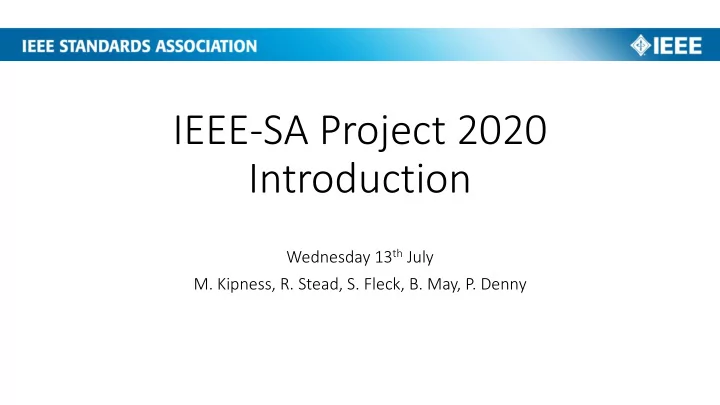

IEEE-SA Project 2020 Introduction Wednesday 13 th July M. Kipness, R. Stead, S. Fleck, B. May, P. Denny
Robert Stead Managing Director, Sense Media Group
Agenda Robert Stead, Sense Media Group • IEEE-SA process and procedures that will be followed • Status update, and outline of PAR (Project Authorization Request) Benjamin May, AMX13 • Why is this activity required? • How can you be involved, what do you need to do? Sven Fleck, SmartSurv • Kick starter on research discussion, proposed initial steps for working group activity • Reminder of face-to-face meeting and how to sign up
Basic Principles of IEEE Standards Development IEEE standards development is guided by a set of principles. These imperatives maximize fairness and good practices during the standards development lifecycle and help to validate approved standards. Openness - Ensures all interested parties can participate actively Due Process - Having highly visible procedures for standards creation and following them Consensus - Holds that a clearly defined majority of those in a balloting group vote to approve a draft standard Balance - Ensures that a balloting group includes appropriate categories of interested parties and avoid an overwhelming influence by any one party Right of Appeal - Allows anyone to appeal a standards development decision
Process for Working Group Meetings Every WG must have WG Policies & Procedures (P&Ps). The WG P&Ps explain the role of the WG officers, actions requiring a vote, and additional information. P2020 P&Ps will be made available prior to the September meeting. We will: • Send out agendas in accordance with the WG P&Ps. • Remember to disclose affiliations. • Establish quorum during meetings. • Make a Call for Patents at the start of each WG meeting. • Do not discuss commercial activities or terms. • Follow guidance on meetings minutes in the WG P&Ps and Standards and the Law. • Distribute meeting minutes on time. • Maintain an updated roster.
Progress to Date P In progress Sept 2016 March 2018
PAR Summary Sponsoring Society and Committee: IEEE Vehicular Technology Society/Intelligent Transportation Systems (VT/ITS) PAR link: https://development.standards.ieee.org/get-file/P2020.pdf?t=89521200003 Project information: https://standards.ieee.org/develop/project/2020.html Contact Information for IEEE-SA Liaison Name: Michael Kipness Email Address: m.Kipness@ieee.org Phone: +1 732-562-3810 Contact Information for Standards Representative Name: Thomas Kurihara Email Address: t.kurihara@ieee.org Phone: +1 703-516-9650
PAR Summary (2) Scope: This standard addresses the fundamental attributes that contribute to image and quality for automotive Advanced Driver Assistance Systems (ADAS) applications, as well as identifying existing metrics and other useful information relating to these attributes. It defines a standardized suite of objective and subjective test methods for measuring automotive camera image quality attributes, and it specifies tools and test methods to facilitate standards-based communication and comparison among OEM and Tier 1 system integrators and component vendors regarding automotive ADAS image quality.
PAR Summary (3) Purpose: This standard specifies methods and metrics for measuring and testing automotive image quality to ensure consistency and create cross-industry reference points. Need for the Project: Cameras are being used in greater numbers in automotive applications. Most of these systems have been developed independently, with no standarised calibration or measurement of image quality. Consumers have no standard reference point when using camera enabled systems, and OEM/Tier 1 developers cannot compare camera systems side by side. Stakeholders for the Standard: Automotive OEMs, Automotive Tier 1 suppliers, image processing software and hardware companies, optics companies, sensor manufacturers, safety certification bodies, end users (drivers).
Benjamin May , Director, AMX13
The Need for Standards • Increase of vision based sensing in automotive • Significant impact on safety in the future • Visual systems mandatory in US, other countries/regions to follow • General consensus at industry gatherings that standards development would be universally beneficial
Different key requirements in automotive • High dynamic range • Low latency requirement • Reliability requirements • Interaction of vehicle/street/traffic sign illumination and camera system • End-to-end image quality on system level requirements: camera to display • Multi camera / multimodal sensor system requirements
A Complex Ecosystem Support Component services supplier (Tier2) Technology Component System A Provider supplier supplier (Tier3) (Tier2) (Tier1) Technology Semi Provider OEM conductor (Tier3) supplier (Tier2) System B Semi supplier conductor (Tier1) supplier (Tier2) Not supply chain but supply net! • Complex interaction of different layers of automotive market. • Different requirements and expectations.
Scope Limitation – what will not be covered P2020 will (initially) not cover: • Non-vision sensor based solution • Potential to explore this in further Working Group activities
SvenFleck Managing Director, SmartSurv
What will be covered – Goals Suggested objectives: • Joint KPI definition for automotive vision based systems • Definition of measurement techniques • Comparison of components and systems • Impact on machine vision systems and KPI definition • Interface measurement equipment (“ONVIF for automotive”) • LED flicker standardization • Post-ISO26262 requirements • Define System Level KPIs “end to end”, SAE > Level 4 KPIs
What can you do? • Attend meeting and calls (online and in person) • Contribute, share your views, don’t be shy! • Volunteer to help with workload and research • Follow IEEE-SA protocol • All materials, minutes, and resources will be made available online via the IEEE-SA portal – make the most of the resources • Spread the word to help ensure comprehensive engagement
Next Steps • Face-to-face meeting: 9am-12pm, Tuesday 20 th September, AutoWorld Museum, Brussels, Belgium (immediately prior to AutoSens conference) • Questionnaire – to gather input and form the basis for the first round of proposed sub-projects • Establish online framework, training of officers • Define meeting schedule for 2016/2017 • Drafting of Outline to serve as framework for standard development • Nominate committee and working group leaders, volunteers welcome!
Key Contacts – P2020 Officers Chair Robert Stead +44 208 133 5116 rob@sensemedia-events.com Vice Chair Dr. Sven Fleck +49 176 61040825 fleck@smartsurv.de Secretary Benjamin May +49 173 2386833 Benjamin.may@amx13.com Treasurer Prof. Patrick Denny +353 93 23184 patrick.denny@valeo.com
Recommend
More recommend